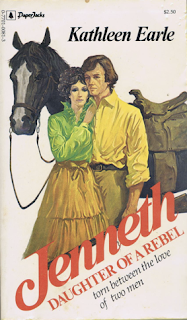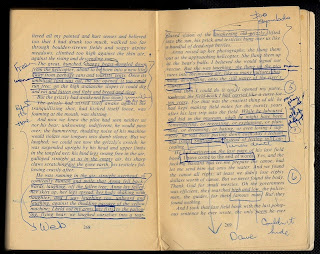The Sixth of December
Jim Lotz
Markham, ON: Paperjacks, 1981
I'm both pleased and honoured that expat Canadian writer Mark Reynolds has contributed this, the very first Dusty Bookcase guest post. More of Mark's writing can be found online at View of the Marching Fishes.
When Brian offered me the opportunity to write a guest-post on The Sixth of December by Jim Lotz, I jumped at the chance. It struck me as inspired that someone had thought to link Trotsky’s brief imprisonment in Nova Scotia to the Halifax Explosion. I imagined a Communist of Unrequited Dreams, or perhaps a Forrest Gumpsky – here Trotsky founds the Red Army, there he blows up Halifax, and during his New York exile he advises a young F. Scott Fitzgerald on writing fiction.
The Sixth of December starts 11 months before the titular date, 100 meters under the Atlantic, where a German U-Boat and its crew lay slowly dying. Warships of the Royal Navy prowl the surface, drawing their net of depth charges ever closer on the helpless sailors below.
Finally, Kapitanleutnant Wolfgang Von Lothringen – aristocrat, conveniently English-educated, fanatic in the cause of the Fatherland – makes a desperate decision to make a break for it, surfacing his vessel and firing his last torpedo at his tormentors. However, the torpedo misfires and U-42 is destroyed. Von Lothringen survives, along with one crew member – Lothar Brutcher – and a Scottish merchant captain unwillingly aboard as a prisoner. The other 30 sailors under his command die, never to trouble the narrative or the conscience of their captain again.
As an opening scene, it’s a doozy, and it contains within it all the best and worst that the book had to offer. I believe the opening dialogue is best excused by the fact that both the characters were desperately starved of oxygen when speaking it:
”Do you see this?” [Von Lothringen] asked, pulling a cigarette case out of his pocket and thrusting under the nose of the Scot. “Made of steel, from the battlefield of Verdun. My brother and his regiment went in with the first wave on February 21 last year. Only ten men came out alive. One of them made this for me – in memory of my brother. Then he went back and was killed.”On the other hand, while the means by which Von Lothringen was trapped by the Royal Navy was similarly hard to believe, it turned out to have been based on fact.
The Scot shook his head. “You’re a stubborn lot, you Germans.”
Indeed, as I read on, it turned out that there was very little outside of the doings of the main characters in The Sixth of December that was not based on fact. The book might be that rarest creature of all – a historical fiction that does not fictionalize any of the history. That speaks well of Lotz’s professional standards – he is still, as far as I am aware, an active author of Maritimes history. The man clearly loves Nova Scotia and its past; I learned a great deal from The Sixth of December, but learning was not what I was hoping to gain from a book that promised “The Terrorist Plot of the Century!”
Lotz’s fidelity to the Muse of History puts some unfortunate constraints on the story. Leon Trotsky would have made a fairly compelling arch-villain for such a book, had Lotz been willing to depart from the record on occasion. Lotz was not, so the founder of the Red Army disappears from the narrative about one third of the way through. As Trotsky took his leave of the Amherst prisoner of war camp seven months before the Imo and Mont Blanc collided, I didn’t exactly expect him to be cackling from atop the town clock as Halifax burned, but readers might have appreciated a coded telegram or two, or a least a spit-take from the Kremlin.
 |
| Leon Trotsky, St Petersburg, May 1917, weeks after being released from the Amherst camp. |
The reasoning for this was somewhat convoluted: Trotsky planned to pull Russia out of the war, which he believed would both cause the Allies to lose, and also to intervene in the Revolution. If the latter occurred, he believed the Allies would use Halifax as a staging port (those who know of the Siberian Expeditionary Force will realize he was not entirely wrong in this, but that adventure launched from the West Coast). American involvement in the War both obviated and added urgency to the plot, in ways I cannot wrap my head around even after three readings of the explanation.
After Trotsky is detained, that justification was jettisoned in favour of revenge against the Canadians for the indignity of his imprisonment. In his brief time in Amherst (less than a month) he managed to convert a number of the other prisoners to socialism, and hatched an escape plot with the most promising of them – Von Lothringen among them. Trotsky’s powers of persuasion in such a brief period against enemy sailors were also hard to believe, but again, the rendering was scrupulously true.
Trotsky’s arrival date in Amherst (April 6, 1917) was tantalizingly near that of the Battle of Vimy Ridge, and so that event makes an appearance as well. Our hero, Sergeant Jack Dobney, a North-End Halifax boy strong of jaw and stalwart of heart, fights his way though the battle, only to “catch a Blighty.” In the dressing station he meets pure-hearted but strong-willed Beth, a privileged South-End beauty serving near the front as a nurse. Sparks fly. I suspect the headiness of the moment could only have been amplified by an unnamed future author of high-school textbooks in the background of their burgeoning romance observing that “They’ll say that this is the day that Canada became a nation.”
Dobney’s wound is his ticket back to Halifax and, compelled by the conventions of the genre, Beth follows shortly after. Dobney is eventually enmeshed in a military police investigation involving supplies intended for the front going missing from the docks. Meanwhile, back in Amherst, Von Lothringen, Brutcher, and Kurt Hafner (another German submariner) escape. Von Lothringen makes it to Halifax, where he spends the next few months establishing himself as a bon vivant Swedish count, aided by money and materiel supplied by the apparently pervasive Communist underground active in Halifax at the time. The various deus ex Bolsheva means by which our fugitive’s adventures were furthered were always attributed by them in marveling tones to Trotsky, though again, the author refuses to trifle with the historical record enough to detail his involvement.
+1931.png) |
| The Canada Car and Foundry Co., Amherst, Nova Scotia, in 1931. Fourteen years earlier it served as the prisoner of war camp at which Trotsky was held. |
Once the three Germans are reunited in Halifax, and Jack Dobney is undercover attempting to tease out the nature of the conspiracy, Lotz dispenses with most of the Nova Scotia sightseeing and historical trivia in favour of what I can happily report is a fairly engrossing cat-and-mouse game, the stakes of which are all the more foreboding for being known. The meticulous research (mostly) aids the plot and heightens the tension, rather than distracting from it as in the earlier pages. Unsuspected nuances of character appear, much to the book’s benefit.
But… but but but. The Terrorist Plot of the Century? The smiling face of Trotsky rising from the smoke of the Mont Blanc on the cover? Well, poor Mr Lotz set himself an impossible challenge. How does one turn the Halifax Explosion into the Terrorist Plot of the Century without altering a word of the historic record? That, alas, was a circle even 2,300 tons of pitric acid, 200 tons of TNT and 35 tons of benzene could not square. The German saboteurs failed in their own attempt to blow up the Mont Blanc (on December 5th), but did contrive to make it on to the bridge of the Imo just as the two ships were heading towards each other in the Halifax Harbour Narrows. It proved to be an excellent vantage point to watch Halifax be destroyed, with almost no effort required on their part.





































